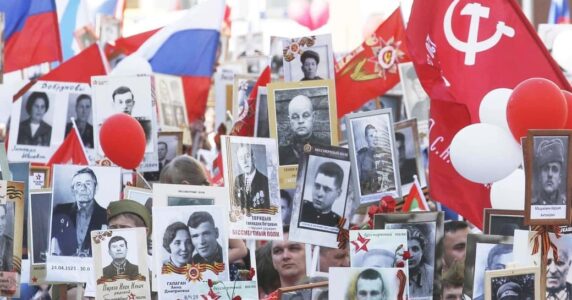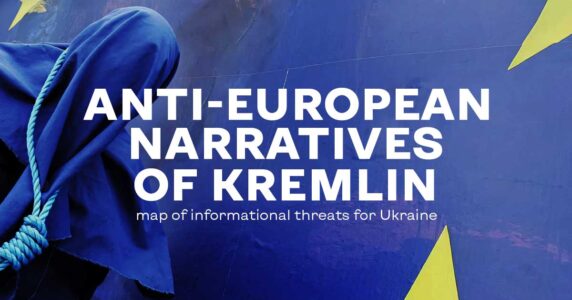Navigation and useful materials
While Russia was not invited to the Davos forum, it still somehow infiltrated it in spirit. So much so that it was noticed by Ukraine’s Foreign Minister Dmytro Kuleba. The Centre for Strategic Communication and Information Security has collected the main fakes and narratives of the Russian propaganda of May 27-29.
- The West will not abandon Ukraine.
- Scholz is tired of the “collective West” narrative.
- Russian sailors with stolen grain.
- Ukrainians’ secret weapon.
Following the recent international forum in Davos, Ukraine’s Foreign Minister Dmytro Kuleba summed up the key Russian narratives that could be heard there. He warned that “during the next days and weeks, Russia will be promoting them very actively.”
We have already written how Ukrainians responded to realpolitik veteran Henry Kissinger, who urged the West in Davos to make Ukraine concede to Russia’s terms. This idea was supported by another grandpa of global politics, Italy’s former PM Silvio Berlusconi.
The West will not abandon Ukraine
But Moscow will ramp up its pressure, especially on current Western politicians, who are dependent on their constituencies.
So, the first Russian narrative goes like this: “There is no point in Ukraine resisting, because the West will leave it high and dry anyway, so there is no point in hoping for anything.”
IN REALITY at least several facts prove that it is not happening. To take the “collective West,” let’s look at its leader (according to the Kremlin itself), the US.
On May 29, the Pentagon published photos of another batch of military aid to the Armed Forces of Ukraine — towed 155-mm howitzers M777 produced by the UK.
Since the end of February, Washington has supplied 23.8 tonnes of weapons and miliatry equipment to Ukraine, according to the data of US Transportation Command.
In particular, 23,942 anti-tank guided missiles, 1,033 anti-aircraft missile systems and 1,468 missiles, 90 howitzers, 174,173 artillery shells, 9 helicopters, 33 radars and 7,888 machine guns and pistols were transported from the continental United States. In addition, about 68.5 thousand bulletproof vests and 50 thousand helmets were sent to Ukraine. In total, since February 24, the United States has sent $3.9 billion in military aid to Ukraine.
As of May 10, as a reminder, 36 countries have allocated $64.5 billion to Ukraine, including $34.7 billion for the military component, $18.5 billion for the economic component, $12.5 billion for humanitarian needs.
They wouldn’t have given this money just to abandon Ukraine later. As proven by the first lend-lease of 1941-1945.
Scholz is tired of the “collective West” narrative
Another narrative noticed by Kuleba goes like this: “Ukraine has diverted the world’s attention from solving other problems. There is a lot of grief and misery in the world, and the West is focused on Ukraine.”
This is the source of regular Russian media reporting about “food cards” in France, “hunger strikes in the UK, “coupons for fuel” in Italy and “baby food shortage” in the US.
But Europe is not the main target of the propaganda attack. This is Russia’s way to stir up Africa and the Middle East, partially Asia. Kuleba says that you need to work on this narrative well, because “this scheme is fairly effective.” And it is effective because it is used in a specific targeted manner.
IN REALITY, Russia spends enormous resources on propaganda and subversive activities in Asia, Africa, Latin America and Europe.
When it comes to supporting Ukraine, they immediately remember the narratives about “Nazis.” And it is not even people from Russia spreading them. For example, Zsolt Bayer, one of the closest allies of Hungarian PM Viktor Orbán, promotes the idea that Ukraine is similar to the Nazi Germany in the local media. The most influential governmental newspaper, Magyar Nemzet, has recently published the content of a recent video by Bayer.
Among other things, in this video, he questions the existence of Ukrainian culture and Ukrainian nation as such, illustrating his words with images with Russian narratives that allegedly Ukrainian territories are not Ukrainian but rather taken away or received from Russia and Poland.
“If we remove Russian culture from Ukrainian culture, what is left will be pathetically petty and stupid,” Bayer believes.
That’s why, when Orbán blocks the 6th set of EU’s sanctions against Russia explaining it by the energy dependence of his country, it should be kept in mind that this dependence, among other things (or even largely) is mental. And reminders of the suppression of the 1956 Hungarian uprising by Soviet troops could not overcome this dependence. At least for now.
If this is happening in Europe, the situation is even tougher in Africa, Asia, Latin America. The Russian propaganda “explains” there that “regular people suffer from the collective West, which condemns them to starvation because of Ukraine.”
Even German Chancellor Olaf Scholz is tired of this narrative of the “collective West.” “Putin always speaks of us as a collective West. He is trying to accuse Ukraine’s supporters of the hunger crisis caused by the war that he started… Russia’s actions in Ukraine are targeting not only Ukraine itself but also the values of the Western democracy,” said Scholz.
A response came soon enough in prime time on a federal channel Rossiya 1 with another nuclear threat followed by “Who do you think you are, you freak?”
After that, on May 29, Germany provided EUR 1 billion worth of military aid to Ukraine.
Russian sailors with stolen grain.
“The only reason for the food crisis in the world is sanctions imposed on Russia” — this is the third Russian narrative phrased by Dmytro Kuleba after Davos.
Putin promoted it during a joint telephone conversation with French President Macron and German Chancellor Scholz. Here is the Kremlin’s way out of the food crisis.
IN REALITY, it looks like this: “I stole part of the territory from a neighbouring country. I got sanctions for this. Then I stole some more, killed thousands of people. Got even stronger sanctions. Then I stole all the grain, blocked the ports and threatened to stage a world famine. That’s why I demand that the sanctions be lifted.” How else should the entire civilized world view Putin’s message?
The UK Defence Ministry said that “Russia has demonstrated its readiness to use the global food security in its political interests and then act like a smart player and accuse the West of failures.”
Well, while the “smart player” is playing hunger games with the whole world, CNN reports that the Russian dry cargo ship “Matros Pozynich” with stolen Ukrainian grain has arrived in the Syrian port of Latakia. And this is the second time this month.A week ago, satellite images showed stolen grain loaded on ships in the occupied Crimea. The footage of May 19 and May 21 shows that two Russian ships, Matros Pozynich and Matros Koshka, were loaded with grain and then took sail. One of them went in the direction of Beirut, and the other one was in the Black Sea.
Of course, Russia’s Deputy Foreign Minister Andrey Rudenko is saying that Russia is “not stealing anything from anyone.”
The Economist Editor-in-Chief Zanny Beddoes said at the Davos Forum: “Ukraine feeds 400 million people worldwide. This is an important factor in making the world think about what to do next for non-NATO countries. It will be a mockery of the world community, if the world can’t unblock the ports, can’t solve this situation. “
However, it is not yet clear how to negotiate with a thief who stubbornly claims not to steal anything. The White House has already stated that the US is not considering the possibility of lifting the sanctions imposed on Russia in exchange for enabling supply of the Ukrainian grain on the global market. Russia is, of course, in line for the program “oil in exchange for food,” like in the case with Iraq. But later.
We will remind you that this program allowed Iraq, which was under sanctions, to sell oil on the global market in exchange for food and other needs required by civilians in the country, while preventing it from using oil revenue to restore its military potential.
Ukrainians’ “secret weapon”
“Why is Ukraine resisting so hard, causing such unspeakable suffering to its own people and its own country? If the war is so difficult, if everything is so bad, then you need to sit down and negotiate. Whatever the price of this agreement may be.” This is the fourth Kremlin narrative, as identified by Dmytro Kuleba.
It follows from the previous three. It has actually been the main one since the beginning of the war. Putin actually thoughts that Ukrainians would submit. Initially, as to a “liberator.” Now, after what he did with Ukrainian cities, as to “the winner.”
This narrative has been supplemented by a new factor. Allegedly, Ukraine must make concessions now to allow Putin to “save face.”
On May 9, Macron said that the war between Ukraine and Russia will inevitably end with peace, but neither party should feel “humiliated” when it is discussed.
2007 Nobel Prize winner Eric Maskin said that in Zelenskyy’s place, he “would have made concessions so that the war would end quickly and most of Ukraine would not be destroyed.”
IN REALITY, these attitudes will be growing stronger. We must be ready for this. But the answer was best phrased by a woman born 124 years ago in Kyiv in May: “We want to live. Our neighbours want to see us dead. That doesn’t leave much room for compromise.” The woman’s name was Golda Meir. She would later say of the victory of the state of Israel in the struggle for its existence in a continuous environment of hostile countries: “We had a secret weapon: no alternative.”
In addition to this “secret weapon,” the 2022 Ukraine has many official weapons. And more is coming. Therefore, the next days and weeks after Davos will be difficult, but everything will turn out well. And at the next economic forum, we will hear entirely different narratives.
If you have found a spelling error, please, notify us by selecting that text and pressing Ctrl+Enter.


